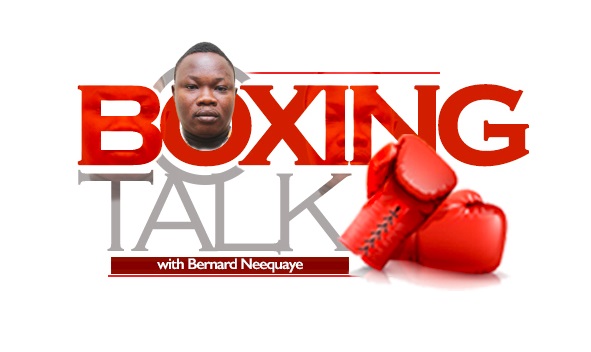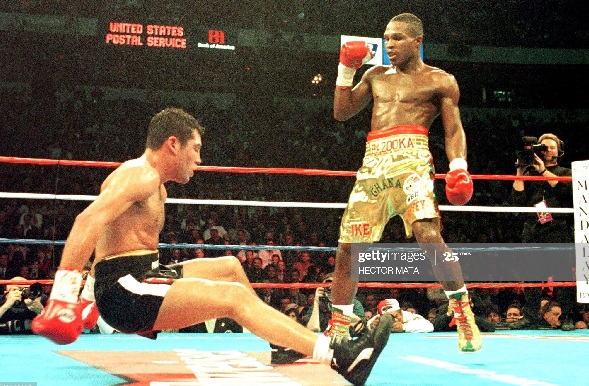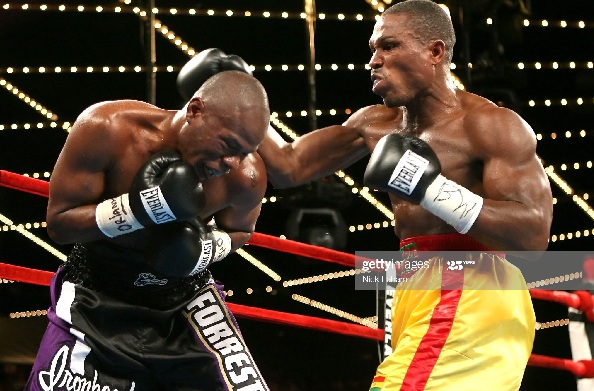Major and Latest Boxing news in Ghana

FEATURE: Why Ike Quartey’s boxing career is worth celebrating!
It took Ike Quartey dedication and hard work to reach the pinnacle of the sport in his heyday. He needed six years as a professional to realize his dream of becoming a world champion.
That emphatic 11th round knockout victory over Venezuela’s Crisanto Espana in France set him off on the world stage in 1994
Advertisement
He was an underdog ahead of the bout but proved superior at the end with a well calculated master plan.
“I had to go through hell to train for the Espana fight because my whole career was based on that.
“It was an opportunity for me to prove myself as one of the best in the division and I did that with a master plan,” Quartey told the Graphic Sports.
The hard-hitting Ghanaian had to relocate to France in search for a world title fight. He finally got one and that was against an undefeated Espana.
How did the journey begin?

Background
Quartey comes from a boxing background with a family of 27. His elder brother, Isaac Quartey, won a silver medal at the 1960 Olympic Games.
With an amateur record of 50-4, Quartey competed in the 1988 Seoul Olympic Games and lost at the quarter final stage.
After a disappointing end at the Olympics, Quartey turned professional in 1988 at age 19 immediately after the tournament.
He was under the guidance of renowned boxing manager, Yoofi Boham, when he turned professional but later teamed up with Ringcraft Promotions.The decision to join Ringcraft brought controversies.
“It was a bad thing to do to me because I had a contract with him and Alfred Kotey when he signed for them,” said Mr Boham.
“Ringcraft stole him from me at the home and I remember my wife wanted to go to court to seek redress.”
At the end, Quartey got his wish after Mr Boham decided against going to court. He made his Ringcraft debut in 1990 against Mohammed Muritala with an explosive first round stoppage victory.
His new promotional outfit subsequently ensured he earned huge reputation as an athlete in Ghana with 21 knockouts from 25 victories.

Post Espana fight
The Venezuelan was unbeaten until he defended his title against Quartey. He was a marathon runner who was as fit as a fiddle.
Going past him in 11 rounds was tough for Quartey.
“I had to do it for my country and myself. It was the toughest fight of my professional career.”
“I remember I went through a lot of tests after the fight because Espana’s camp suspected me of doping.”
The victory ended Espana’s bright career after he suffered a detached retina. He was advised by doctors to quit the sport which led to an early retirement at age 31 after just one more fight.
Biggest career fight
In 1999, Quartey landed himself what became the biggest fight of his career when he took on Oscar de la Hoya in Las Vegas.
Prior to the fight, he was stripped of the WBA belt because he failed to defend it. Quartey had blamed his inability to make a ninth defence of the title on malaria.
He complained of contracting the flu during preparation for his eighth defence against Jose Luis Lopez which ended in a draw.
The flu kept Quartey out of shape for over a year and Top Rank later contracted him to fight de la Hoya for the World Boxing Council (WBC) championship of the world. The fight was to take place on November 21 in 1998 but was postponed.
“He was afraid to fight me so he chickened out by making excuses of an injury.”
“I was in the best of shape and I could have stopped him if it hadn’t been postponed. He sent spies to my training base who told him how well I was prepared.”
He finally met Oscar but lost controversially in a split decision.
“I really felt bad after the fight because everyone saw that I won. You can’t judge a fight on just a round and I felt devastated after the defeat.
“Oscar can never beat me on any day but politics gave him the verdict,” Quartey noted.

Inconsistent run
Quartey failed to climb back to the top after the defeat to de la Hoya. He fought Fernando Vargas next for the International Boxing Federation (IBF) title in March 2000 and lost on a unanimous decision.
Since then, he fought five times with three wins and two defeats. The fight included defeats to Vernon Forest and Ronald Wright which became his final bouts as a boxer.
“I lost interest in boxing after that robbery to de la Hoya and it really affected my subsequent fights.”
However, Quartey relocated to Ghana soon after his retirement in 2006, and with the millions of dollars he made from the sport, he owns two hotels in the capital as well as an eighty per cent completed hospital.
“I want to give back to the society that helped me throughout my career as a boxer. This is the only thing I can do to help them,” Quartey noted.
Despite the ups and down, Quartey is regarded the best Ghanaian fighter ever after legendary Azumah Nelson due to his achievements.
He is currently the Technical Director of the Ghana Boxing Authority.



